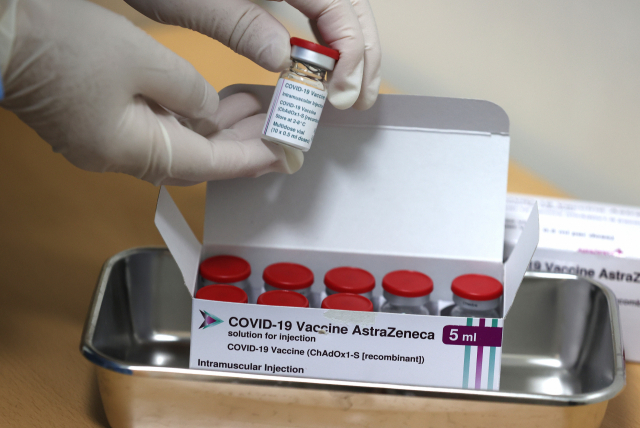AZ is also “no evidence”… Observed EMA’vaccine-free’ conclusion
Government’s’thrombosis after vaccination’ to be released on autopsy results
 viewer
viewer
Amid controversy over the formation of blood clots after vaccination against AstraZeneca (AZ)’s novel coronavirus infection (Corona 19), the results of an investigation by the European Medicines Agency (EMA) will be announced today as early as possible. The announcement time has not been specifically confirmed, but if the announcement is made in the morning of the 18th (local time) in the UK, it will be the evening or early night time in Korean time. The government will follow up on EMA’s findings.
From the perspective of the World Health Organization (WHO) or EMA so far, it is highly likely that a conclusion to the effect that there is no link between vaccine and blood clots will be drawn, but it cannot be affirmed. The EMA said earlier that there was no link between the two cases of thrombosis reported in Austria and vaccination.
AstraZeneca also announced that it found no evidence that its vaccine increased the risk of developing blood clots. A review of all possible safety data on more than 17 million vaccinated individuals in the European Union (EU) and in the UK showed no evidence of an increased risk of pulmonary embolism, deep vein thrombosis, and thrombocytopenia. Kim Jung-gon, head of the vaccination damage investigation team, also predicted at a briefing the day before, “If tomorrow (18th), the European Medicines Agency will announce it, but the formation of blood clots by vaccination will not be such a big problem.”
While more than 20 countries in Europe have suspended or withheld AstraZeneca vaccination as a prophylaxis, the government maintains a position that the vaccination will proceed as planned, as there is no basis for stopping vaccination at this time. However, there is a possibility that the detailed guidelines may vary slightly depending on the results of the EMA investigation.
Inquiry about whether the AstraZeneca vaccine side effect can be concluded as a’thrombosis’ at a general meeting of the National Assembly Health and Welfare Committee the previous day, Director of the Korea Centers for Disease Control and Prevention Chung Eun-kyung said, “According to health insurance data, pulmonary embolism (thrombosis caused Diseases that are caused by blockage) are diagnosed in about 17,000 people a year. It is a disease that continues to occur in the usual way,” he answered. “You can get the AstraZeneca vaccine. All the KCDC staff are also vaccinating it,” Chung said. “We will continue to monitor safety.”
Even with the results of the EMA recommending AstraZeneca vaccination, the anxiety is unlikely to go away. Moreover, as there are cases of blood clots among those who died after vaccination in Korea, controversy may continue for some time until the authorities announce the correct autopsy results.
In this regard, Commissioner Chung said, “I am waiting for the final result report of the autopsy, and if the results come out, I will receive an expert and damage investigation team review and explain to the public.” The death toll was a patient admitted to a nursing hospital in their 60s, and the Corona 19 vaccination damage investigation team currently sees the cause of death as aspiration pneumonia and acute myocardial infarction, not vaccines. In addition to pneumonia and myocardial infarction, the damage investigation team explained that thrombosis is not a disease included in adverse reactions to the COVID-19 vaccine, and that the AstraZeneca vaccine currently being vaccinated is a product commissioned in Korea and is different from the vaccine that caused problems in Europe.
In the midst of this, the government’s plan to inoculate 12 million people within the first half of the year may be disrupted if a movement to evade the AstraZeneca vaccine occurs in Korea. This is because the AstraZeneca vaccine accounts for the largest portion of the vaccines introduced in the first half. The amount of AstraZeneca vaccine expected to be introduced in the first half of the year is 5337,000 people (1,0674,000 doses). The Pfizer vaccine is for 3,58,500 people (717,000 doses), and Janssen (Johnson & Johnson), Modena, and NovaVax have not specifically confirmed the introduction schedule.
/ Intern reporter Park Yena [email protected]
< 저작권자 ⓒ 서울경제, 무단 전재 및 재배포 금지 >
